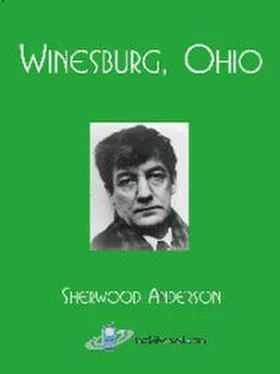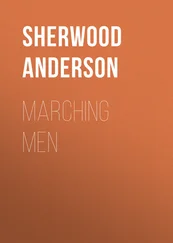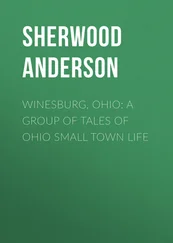Sherwood Anderson - Winesburg, Ohio
Здесь есть возможность читать онлайн «Sherwood Anderson - Winesburg, Ohio» весь текст электронной книги совершенно бесплатно (целиком полную версию без сокращений). В некоторых случаях можно слушать аудио, скачать через торрент в формате fb2 и присутствует краткое содержание. Жанр: Старинная литература, на английском языке. Описание произведения, (предисловие) а так же отзывы посетителей доступны на портале библиотеки ЛибКат.
- Название:Winesburg, Ohio
- Автор:
- Жанр:
- Год:неизвестен
- ISBN:нет данных
- Рейтинг книги:3 / 5. Голосов: 1
-
Избранное:Добавить в избранное
- Отзывы:
-
Ваша оценка:
- 60
- 1
- 2
- 3
- 4
- 5
Winesburg, Ohio: краткое содержание, описание и аннотация
Предлагаем к чтению аннотацию, описание, краткое содержание или предисловие (зависит от того, что написал сам автор книги «Winesburg, Ohio»). Если вы не нашли необходимую информацию о книге — напишите в комментариях, мы постараемся отыскать её.
Winesburg, Ohio — читать онлайн бесплатно полную книгу (весь текст) целиком
Ниже представлен текст книги, разбитый по страницам. Система сохранения места последней прочитанной страницы, позволяет с удобством читать онлайн бесплатно книгу «Winesburg, Ohio», без необходимости каждый раз заново искать на чём Вы остановились. Поставьте закладку, и сможете в любой момент перейти на страницу, на которой закончили чтение.
Интервал:
Закладка:
"Well," he said softly, "I don't know how it was. I was happy. You see how that was. Helen White made me happy and the night did too. I wanted to suffer, to be hurt somehow. I thought that was what I should do. I wanted to suffer, you see, because everyone suffers and d—s wrong. I thought of a lot of things to do, but they wouldn't work. They all hurt someone else."
Tom Foster's voice arose, and for once in his life he became almost excited. "It was like making love, that's what I mean," he explained. "Don't you see how it is? It hurt me to do what I did and made everything strange. That's why I did it. I'm glad, too. It taught me something, that's it, that's what I wanted. Don't you understand? I wanted to learn things, you see. That's why I did it."
Death
The stairway leading up to Doctor Reefy's office, in the Heffner Block above the Paris Dry Goods store, was but dimly lighted. At the head of the stairway hung a lamp with a dirty chimney that was fastened by a bracket to the wall. The lamp had a tin reflector, brown with rust and covered with dust. The people who went up the stairway followed with their feet the feet of many who had gone before. The soft boards of the stairs had yielded under the pressure of feet and deep hollows marked the way.
At the top of the stairway a turn to the right brought you to the doctor's door. To the left was a dark hallway filled with rubbish. Old chairs, carpenter's horses, step ladders and empty boxes lay in the darkness waiting for shins to be barked. The pile of rubbish belonged to the Paris Dry Goods Company. When a counter or a row of shelves in the store became useless, clerks carried it up the stairway and threw it on the pile.
Doctor Reefy's office was as large as a barn. A stove with a round paunch sat in the middle of the room. Around its base was piled sawdust, held in place by heavy planks nailed to the floor. By the door stood a huge table that had once been a part of the furniture of Herrick's Clothing Store and that had been used for displaying custom-made clothes. It was covered with books, bottles, and surgical instruments. Near the edge of the table lay three or four apples left by John Spaniard, a tree nurseryman who was Doctor Reefy's friend, and who had slipped the apples out of his pocket as he came in at the door.
At middle age Doctor Reefy was tall and awkward. The grey beard he later wore had not yet appeared, but on the upper lip grew a brown mustache. He was not a graceful man, as when he grew older, and was much occupied with the problem of disposing of his hands and feet.
On summer afternoons, when she had been married many years and when her son George was a boy of twelve or fourteen, Elizabeth Willard sometimes went up the worn steps to Doctor Reefy's office. Already the woman's naturally tall figure had begun to droop and to drag itself listlessly about. Ostensibly she went to see the doctor because of her health, but on the half dozen occasions when she had been to see him the outcome of the visits did not primarily concern her health. She and the doctor talked of that but they talked most of her life, of their two lives and of the ideas that had come to them as they lived their lives in Winesburg.
In the big empty office the man and the woman sat looking at each other and they were a good deal alike. Their bodies were different, as were also the color of their eyes, the length of their noses, and the circumstances of their existence, but something inside them meant the same thing, wanted the same release, would have left the same impression on the memory of an onlooker. Later, and when he grew older and married a young wife, the doctor often talked to her of the hours spent with the sick woman and expressed a good many things he had been unable to express to Elizabeth. He was almost a p—t in his old age and his notion of what happened took a p—tic turn. "I had come to the time in my life when prayer became necessary and so I invented gods and prayed to them," he said. "I did not say my prayers in words nor did I kneel down but sat perfectly still in my chair. In the late afternoon when it was hot and quiet on Main Street or in the winter when the days were gloomy, the gods came into the office and I thought no one knew about them. Then I found that this woman Elizabeth knew, that she worshipped also the same gods. I have a notion that she came to the office because she thought the gods would be there but she was happy to find herself not alone just the same. It was an experience that cannot be explained, although I suppose it is always happening to men and women in all sorts of places."
* * *
On the summer afternoons when Elizabeth and the doctor sat in the office and talked of their two lives they talked of other lives also. Sometimes the doctor made philosophic epigrams. Then he chuckled with amusement. Now and then after a period of silence, a word was said or a hint given that strangely illuminated the life of the speaker, a wish became a desire, or a dream, half dead, flared suddenly into life. For the most part the words came from the woman and she said them without looking at the man.
Each time she came to see the doctor the hotel keeper's wife talked a little more freely and after an hour or two in his presence went down the stairway into Main Street feeling renewed and strengthened against the dullness of her days. With something approaching a girlhood swing to her body she walked along, but when she had got back to her chair by the window of her room and when darkness had come on and a girl from the hotel dining room brought her dinner on a tray, she let it grow cold. Her thoughts ran away to her girlhood with its passionate longing for adventure and she remembered the arms of men that had held her when adventure was a possible thing for her. Particularly she remembered one who had for a time been her lover and who in the moment of his passion had cried out to her more than a hundred times, saying the same words madly over and over: "You dear! You dear! You lovely dear!" The words, she thought, expressed something she would have liked to have achieved in life.
In her room in the shabby old hotel the sick wife of the hotel keeper began to weep and, putting her hands to her face, rocked back and forth. The words of her one friend, Doctor Reefy, rang in her ears. "Love is like a wind stirring the grass beneath trees on a black night," he had said. "You must not try to make love definite. It is the divine accident of life. If you try to be definite and sure about it and to live beneath the trees, where soft night winds blow, the long hot day of disappointment comes swiftly and the gritty dust from passing wagons gathers upon lips inflamed and made tender by kisses."
Elizabeth Willard could not remember her mother who had died when she was but five years old. Her girlhood had been lived in the most haphazard manner imaginable. Her father was a man who had wanted to be let alone and the affairs of the hotel would not let him alone. He also had lived and died a sick man. Every day he arose with a cheerful face, but by ten o'clock in the morning all the joy had gone out of his heart. When a guest complained of the fare in the hotel dining room or one of the girls who made up the beds got married and went away, he stamped on the floor and swore. At night when he went to bed he thought of his daughter growing up among the stream of people that drifted in and out of the hotel and was overcome with sadness. As the girl grew older and began to walk out in the evening with men he wanted to talk to her, but when he tried was not successful. He always forgot what he wanted to say and spent the time complaining of his own affairs.
In her girlhood and young womanhood Elizabeth had tried to be a real adventurer in life. At eighteen life had so gripped her that she was no longer a virgin but, although she had a half dozen lovers before she married Tom Willard, she had never entered upon an adventure prompted by desire alone. Like all the women in the world, she wanted a real lover. Always there was something she sought blindly, passionately, some hidden wonder in life. The tall beautiful girl with the swinging stride who had walked under the trees with men was forever putting out her hand into the darkness and trying to get hold of some other hand. In all the babble of words that fell from the lips of the men with whom she adventured she was trying to find what would be for her the true word.
Читать дальшеИнтервал:
Закладка:
Похожие книги на «Winesburg, Ohio»
Представляем Вашему вниманию похожие книги на «Winesburg, Ohio» списком для выбора. Мы отобрали схожую по названию и смыслу литературу в надежде предоставить читателям больше вариантов отыскать новые, интересные, ещё непрочитанные произведения.
Обсуждение, отзывы о книге «Winesburg, Ohio» и просто собственные мнения читателей. Оставьте ваши комментарии, напишите, что Вы думаете о произведении, его смысле или главных героях. Укажите что конкретно понравилось, а что нет, и почему Вы так считаете.












